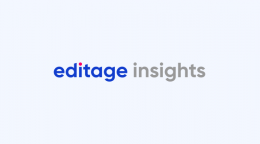The future of academic publishing and advice for young researchers
Interview with Jon Tennant
Meet Jonathan Tennant, early career researcher (PhD in progress, palaeontologist, avid blogger, active tweeter, science communication specialist, and open science proponent ). In this interview series, Jon shares his views on interdisciplinarity in research, emerging peer review models open science, open access, research evaluation metrics, the importance of networking in academia, and the urgent need for increased focus on science policy and academic reform. Jon talks about his interests both within and outside research and shares some valuable life lessons for early-career researchers to help them manage their time well as well as succeed in their research careers. Throughout the series, Jon stresses the need for more and more people to be informed about the most important developments in academic publishing and the need for science communication enthusiasts to fill this information gap.

This interview presents the perspectives of an early-career researcher who conducted research, published papers, attended academic conferences as part of his PhD, traveled to different parts of the world to help educate researchers about open research and science policy, blogged actively, served as a peer reviewer, and made time for several other activities including this interview! Jonathan (Jon) Tennant dived head first into palaeontology research, i.e., his first love, even when it required him to change disciplines. And during this journey, he discovered his passion for all things related to scientific communication and policy, especially open science. He was among those researchers who realize the true potential of networking and utilize it to actively participate in dialogue on some of the most critical issues in academic research — all this alongside managing a demanding research schedule. I spoke to Jon about his interests both within and outside research. I particularly wanted to understand how he was able to pursue serious research as well as be involved in other activities, and learned that the primary driving force behind Jon’s work was his passion for science and the need to ensure that more and more people are informed about the most important developments in academic publishing.
Jon Tennant completed his PhD from the Department of Earth Science and Engineering at Imperial College London. His research focused on patterns of biodiversity and extinction in deep time and the biological and environmental drivers of these patterns. Jon was passionate about science communication and strongly believed that all science should be in the public domain. He took a deep interest in following and talking about how trends in open science impact science communication. He also maintained a blog, Green Tea and Velociraptors, and tweeted actively about topics close to his heart.
For this concluding segment of this interview series, I queried Jon about three things:
- What needs to change in the current academic publishing scenario
- What the future of academic publishing looks like
- What advice Jon has for researchers based on his experiences as a researcher and communicator.
Jon talks about the need to strengthen science policy to consider “the best interests of the commons” and for the whole academic community to embrace the concept of transparency in all aspects of research. He also feels that the current research assessment system needs major restructuring. But it’s not all bleak, according to Jon, for he has some optimistic predictions for the future of science communication. He concludes by sharing some valuable advice for early-career researchers.
If you could change three things about research communication/science policy, what would they be and why?
We often talk about “open” as if it has value in itself. This is only a half truth, and the real value comes from what openness gives you, which depends on the context. In science policy, I would love to see more transparency in the decision making process as a result of being more open. What evidence was used? Where? How was the conclusion reached? What conversations/meetings were had that haven’t reached the public record, and what was discussed at them? This is part of transparency for the sake of democratic accountability, and an important part of social policy making to me. For many, science policy is like reading the conclusions section of a paper, but the methods, material and discussion sections are all completely absent!
I would like to see more policymakers and funders acting in the best interests of the commons. For example, if you have a choice to make between preserving the unsustainable profit margins of some scholarly publishers or offering better value for money elsewhere, then you take the second choice. When you have some publishers making 40% profit margins of at least partial public funding, and largely through prohibiting public access to knowledge, you know something is massively wrong with your system. Changing this certainly includes the development of a robust scholarly communications infrastructure (which people like Björn Brembs and Geoffrey Bilder among others are great advocates for) — essentially crafting an efficient, default workflow for the entire research process, including communication. If governments fund this, we could save billions each year and re-inject it into research instead of wasting it on profiteering publishers, and the relatively low-value high-cost services that they offer.
Most of all, though, we need a complete and massive-scale overhaul of our assessment system. It is completely unacceptable that in the digital age we are still defaulting to lazy and inappropriate assessment criteria for whatever reason. This is actually related to the second point, in that if you build an infrastructure where communication of research (i.e., ~95% of the value) is decoupled from both the concept of journal prestige and the traditional publication process, then we should see a movement away from poor evaluation criteria (i.e., those which are journal-based). In almost every discussion I have with junior researchers, this is what it comes back to. Some are being put off doing science openly, or even correctly, because they fear they will be firstly punished by the publishing system, and then penalized by the research evaluation system. It is outrageous and bewildering that we haven’t managed to come up with a practical, systemic solution to this.
Where do you see academic publishing 20 years from now?
I suspect for one that we will see an almost totally decoupling or deconstruction of what “publishing” is. By that, I mean the process will be streamlined to such an extent that the legitimately valuable services such as copy editing or type-setting are automated or outsourced for incredibly low prices, as some journals are already showing (i.e., by embracing the power of the internet and technology). Peer review becomes an open, constructive, and transparent community-driven process, similar to how we see people use StackExchange. Paywalls are non-existent, and we lament that they even once existed. Traditional publishers still exist, but now offer overlay or data-oriented services, because we’ve created a system where the communication of research is entirely independent of publishing. Instead of publishers and journals picking which papers they should publish, they should be paying for the privilege of getting to publish that work. I see copyright reforming such that it is academics who retain ownership of their work, and not being used as an income-engineering tool for publishers. Evaluation is done by the community, for the community — for example, a simple system like StackExchange where the value of content is based on community-wide assessment and how that content is re-used and digested. Instead of researchers being forced to create crudely written papers, we see a decoupling of the “paper” itself – data collectors publish data; communicators define the context; statisticians analyse the data; machines perform massive-scale meta-analysis on the global knowledge corpus, and we ultimately create a platform or series of platforms that leverages what is eminently capable with modern technology.
Of course, none of this will probably happen, because academic culture is the definition of inertia. But we can and should be optimistic, and strive every day to make sure we are doing research for the good of the commons, and not to line the pockets of a few greedy corporations.
Would you like to offer any other advice to early-career researchers?
I can share some of the things I have learned as a young researcher:
- Develop skills beyond being a researcher. Push your horizons, talk with people beyond academia, and take on as much experience and perspective from others as you can. Listening is so much more valuable than speaking.
- Find something that is important to you, and dedicate your time to doing it. And if you love it, then give it your best!
- Also, no matter what you do in academia, you will always end up getting on someone’s bad side. Usually this means that you’re just challenging the status quo, so don’t be afraid of rising to challenges or meeting resistance, but always be as diplomatic as possible.
- Find existing networks who are working on similar things to your interests! Via social media, the power of communities within science has never been more visible, and there are always people out there for you to learn from, collaborate with, and help out if needed.
- Never be afraid to ask questions: this is how we learn and collectively progress. If someone makes you feel stupid for asking an “obvious” question, that is the sort of arrogance that science could do without — we should all be fully aware that we never stop learning.
- Finally, sometimes it does get a bit much alongside all the other things you have to do as a student, so the best piece of advice I can give is learn how to say “no,” and don’t bite off more than you can chew! Things will always get done eventually by someone, and grad students especially are always over-burdened and over-pressured, so you have to manage your time exceptionally well.
Thanks, Jon, for the insights! This was a fantastic conversation. Good luck with your research and writing. Let’s hope some of your predictions come true!
Other parts in the series
- Part 1: "You should always follow your heart in research"
- Part 2: "Academics are resilient to changes in peer review"
Note: In April 2020, Jon was tragically killed in an accident in Bali, Indonesia. I knew Jon as a kind and witty person and a passionate open science advocate. This interview series is a tribute to him.
Published on: Jul 05, 2016
Comments
You're looking to give wings to your academic career and publication journey. We like that!
Why don't we give you complete access! Create a free account and get unlimited access to all resources & a vibrant researcher community.

Subscribe to Career Growth












